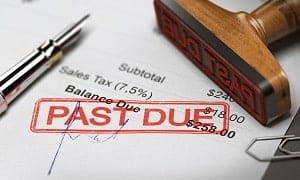If you are thinking about filing bankruptcy, the process can be confusing if you’re not familiar with some of the terminology.
You’ll likely hear your attorney mention the phrases, ‘secured debt’ and ‘unsecured debt.’
So, what’s the difference between secured and unsecured debt.
Secured debt are loans that are guaranteed, or secured, by a physical asset—typically a house or a car.
The physical property serves as collateral for the loan.
Unsecured debt are loans that are not guaranteed (secured) by any collateral.
This can include credit card debt, medical bills, student loans, alimony, and personal loans.
 Secured Debt and Chapter 7 Bankruptcy
Secured Debt and Chapter 7 Bankruptcy
In Chapter 7, you must continue making regular payments on secured debts if you want to keep the property.
Or, you have the option to surrender it back to the creditor.
If the value of the property is less than the loan balance, you can also seek to redeem the property for its true value.
This is useful if you have a car that is upside down.
Secured Debt and Chapter 13 Bankruptcy
In Chapter 13, certain secured creditors are treated differently.
If you are behind on your mortgage and want to bring it current, you must pay the normal monthly mortgage payment plus part of the delinquency every month in the plan.
However, if your mortgage is current, you can continue to pay it outside the bankruptcy because it is thought of as long-term secured debt.
With car payments, you have options, too. If you are set up on automatic debit by your lender, you can continue to pay your car outside the bankruptcy. However, you also have the option of re-amortizing your balance over the life of the plan at a low interest rate (4-5%).
If you’ve owned your car for over 910 days, you can “cram it down” reducing the balance to fair market value.
In both of these cases, at the end of the plan, the car is paid off.
Some secured debts can be removed without giving up the collateral. This is known as lien stripping.
For example, if you owe more on your first mortgage than your home is worth, you can eliminate 2nd mortgages, HELOCS, HOA liens and any other involuntary lien on your home.
Whereas liability for secured debts is dependent on the type of bankruptcy filing, unsecured debt is different.
Personal liability for unsecured debt largely depends on whether the debt is a priority or non-priority.
Unsecured, Non-Priority Debt
Most unsecured debts are considered non-priority and are fully dischargeable in bankruptcy. For instance, these would include credit card debt, medical bills, or personal loans.
Student loans are technically non-priority, but unlike all other non-priority debts, they are generally not dischargeable, absent a showing of “undue hardship.”
Student loans are a huge problem in this country, and maybe at some point down the road, their status in bankruptcy will change.
Unsecured, Priority Debt
Some unsecured debts, such as alimony, child support, and certain unpaid taxes must be paid in full in Chapter 13 in order to get a discharge of other debts.
The good news here is that getting rid of the unsecured debts makes paying these priority debts that much easier.
Filing for bankruptcy can be a lengthy and tough process and should not be done without the legal guidance of an attorney that you trust.
At Parker & DuFresne, our specialty is in bankruptcy law, and our goal is to get clients across Northeast Florida back on the path to financial stability.
Starting with a thorough consultation, we help you determine if this is the right thing for you. Then, we help you to identify the secured versus unsecured debts that may apply to your case.
We will develop the legal strategy best suited for your financial situation, but it doesn’t stop there.
Unlike other bankruptcy law firms, we work with you afterward to rebuild your credit. A better credit rating means lower interest rates on cars and homes, which means MUCH lower monthly payments.
By breaking the cycle of bad credit, you will have financial stability for the rest of your life.
It’s important to hire an experienced bankruptcy attorney when you’re considering filing for bankruptcy to stop foreclosure.
This is because there are many different types of bankruptcy that can be filed. An experienced lawyer will know which one would work best for your specific situation.
It might seem like it makes sense to do this yourself. In reality, most don’t have the time or patience to understand all the details involved in each type of bankruptcy. That means they make mistakes by not choosing the right type, or by not filling out paperwork correctly – both things could lead to delays in getting your case approved and ultimately hurt your chances of getting any debt relief at all.
This is not a journey to take lightly, but it is also not one to take alone. If you need to file for bankruptcy, reach out to us today to start your journey with us.
If you want to learn more about the options you have, call The Jax Law Center for a free consultation.
Parker and DuFresne
